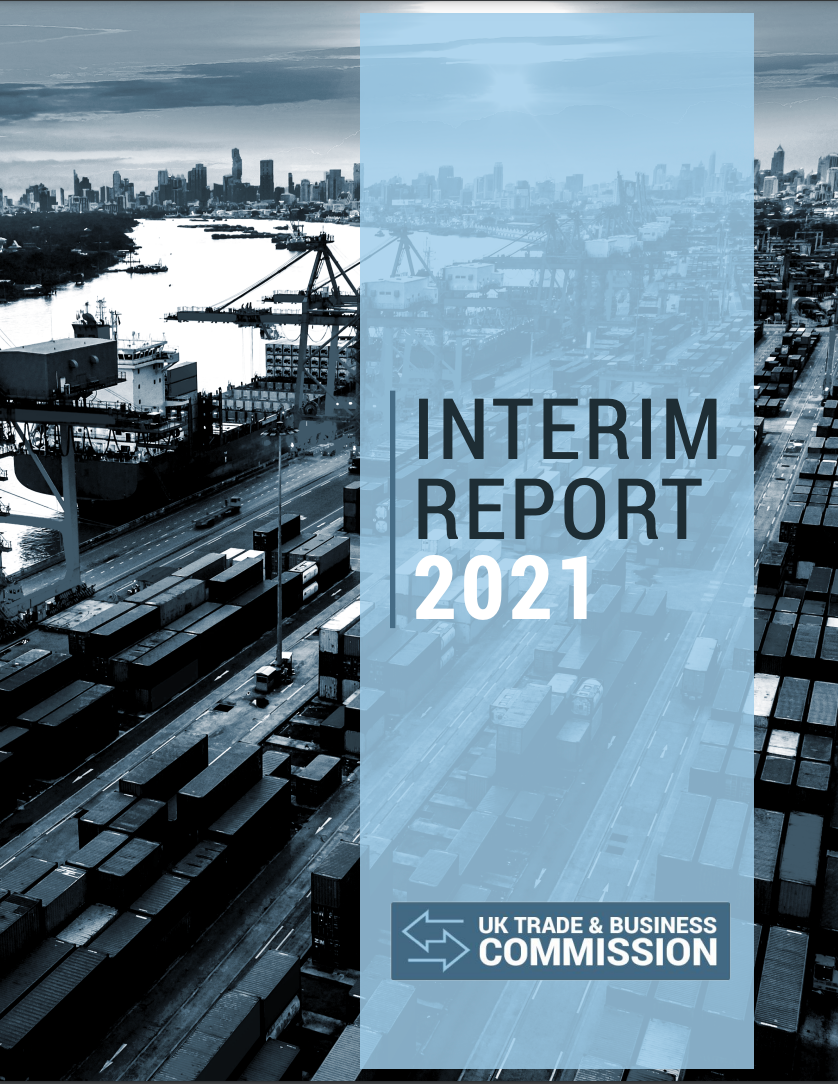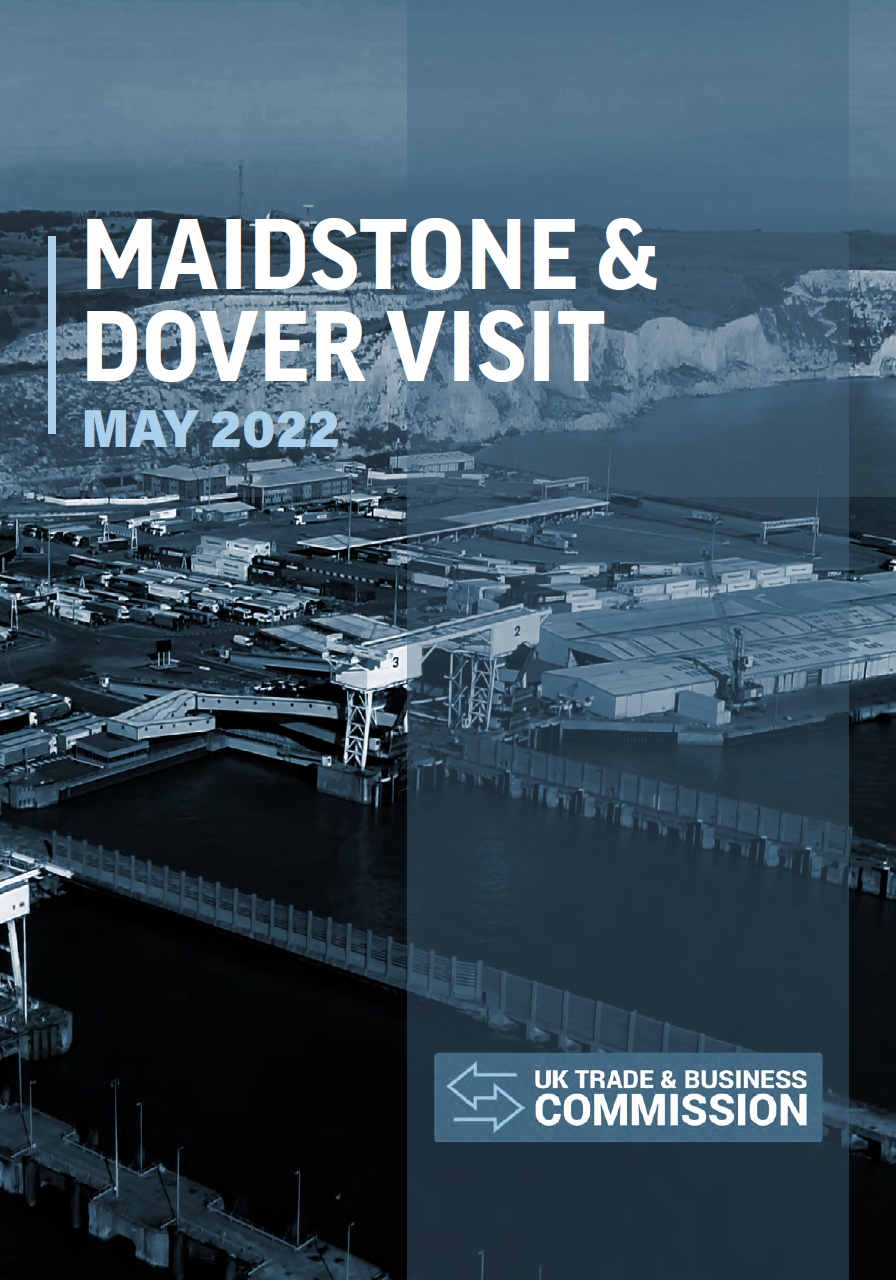UK-EU Trade and Cooperation
The UK Government negotiated the trade and co-operation agreement (TCA) with the EU following its departure from the European Union. The deal was signed on 30 December 2020. It provisionally came into effect on 1 January 2021 before being entering into force on 1 May 2021.
Key Analysis
The UK Trade and Business Commission has taken significant evidence on the UK-EU Trade and Co-operation Agreement, and looked at the economic impact of the deal in a live evidence session on 15th April 2021.
In this special evidence session, members of the UK Trade and Business Commission visited Belfast for its first in-person meeting. This meeting focused on the operation of the Northern Ireland Protocol, hearing from representatives of the Northern Ireland business community about their experiences of operations since it came into force, interactions with those negotiating and implementing arrangements, and views on what needs to change.
The Commission’s first annual report was published on the 11th March 2022 and it proposed 21 concrete interventions, aimed at improving cooperation and trade between the UK and its closest neighbours.
The recommendations were written in support of the many business sectors that continue to bear the burden of costly red tape and barriers to trade, which are artificially increasing costs for them and consumers. The proposals were also aimed at removing points of political tension including around the Northern Ireland Protocol.
This panel was chaired the by journalist Peter Foster.
Interim Report 2021: Analysis
The UK’s trading relationship with its largest trading partner, the EU, underwent a very significant change on 1st January 2021. Trade with the EU, and between Great Britain and Northern Ireland, is now governed by new treaties signed by the UK Government.
It was therefore important that we understand the effects on businesses, not least because, for the first time, a new trade deal has imposed additional costs, checks and red tape on UK businesses seeking to trade.
As discussed in its Interim Report, the UK Trade and Business Commission heard in our evidence sessions about the impact of these new barriers to trade on different sectors of the UK economy, with concerns about lost competitiveness, and potentially jobs, and few new opportunities.
We have heard from companies and specialists who sell goods and services, and from companies large and small, across all parts of the UK. In particular they have said:
UK businesses are suffering because of these new barriers to trade with the EU in all parts of the UK
New trade deals to date have not made up for the costs imposed by these new barriers and may exacerbate problems
Small businesses and freelance workers are encountering particularly severe problems
Northern Ireland businesses face specific difficulties
The Government doesn’t appear yet to fully understand the scale, range and complexity of the issues.
That disruption to trade cannot merely be explained by Covid, and in many cases, Brexit has had a more significant negative impact.
Businesses have long lead times and last minute changes by government can have serious, sometimes fatal consequences, particularly for SMEs. It is not surprising that businesses have faced difficulties given the extent of the change and the impact it is having on supply chains.
These need to be addressed to support UK businesses, and we recommend as immediate steps:
Better engagement with UK businesses by the Government to identify ways of reducing the new barriers and additional costs
The development of an integrated international trade strategy, differentiating areas under full UK Government control from those requiring negotiation , with full consultation with devolved governments and parliaments
Implementation of a programme of export digitisation and improvements to visa processes
Introducing a cross-departmental trade scheme to support SMEs with export capabilities
Focusing negotiations with trading partners, in particular the EU, on improving conditions for UK (and EU) business through building trust and identifying ways of reducing bureaucracy, delay and additional costs.
Annual Report 2021-2022: Recommendations
During the evidence sessions of the UK Trade and Business Commission, witnesses have been asked to provide specific recommendations for government action to make a positive difference. These collectively demonstrate real-world, practical steps that would have a substantial impact on the UK’s economy.
Trade Agreements and Negotiations
A more inclusive process is required given that international treaties have such lasting implications. The process by which the UK Government has, for example, negotiated and ratified the UK-Australia FTA with only limited scrutiny and involvement from industry stakeholders and civil society, has great potential to damage our interests.
We need a more comprehensive, transparent and impartial impact assessment of how new trading arrangements are affecting the UK’s economic structure, particularly for SMEs and devolved nations and regions, and the UK's wider environment and sustainability commitments.
The UK Government should regularly revisit the Trade and Cooperation Agreement with the EU and make necessary adjustments where possible, to ensure our interests are best supported. Areas such as data adequacy and financial regulation are particularly dynamic, and the EU is a hugely important market and regulator so strong ties are needed.
Standards and Regulation
Long-term policy frameworks on issues such as regulatory regimes, visas and funding should be prioritised, rather than suggesting constant change. Such decisions should be made through an open process to ensure wide buy-in.
The UK Government should maintain alignment with EU regulations as a general approach unless there is a strong UK interest in not doing so. For example, to gain a trade advantage or greater consumer or environmental protection.
A comprehensive veterinary agreement with the EU would significantly reduce burdens for the food and drink industry. This would be in terms of both imports and exports, and could also contribute to the resolution of issues around the Northern Ireland Protocol.
Strategic Planning
The UK would benefit from a prioritised, coherent and widely agreed economic strategy, upon which clear trade policy covering areas such as industry, manufacturing, food and SMEs can be based, which in turn supports UK businesses to successfully engage internationally.
Our trade strategy should be much wider than a simple export target, considering many goals such as the attraction of new productive inward investment, regional and sectoral growth across goods and services (widely defined to include areas such as culture and science) and overall sustainability. This would be based on a government-wide approach with clear ownership across government, rather than the current situation where the extent of Department for International Trade ownership of issues is often unclear.
The UK must establish itself as a more attractive destination for the best talent around the world, while improving conditions and skills for all workers to develop our attractiveness for a wider range of foreign investment including in new technologies.
Diplomacy and Partnerships
The UK Government needs to be seen as a trustworthy partner by other countries, working in collaboration with businesses, devolved nations and regions and others. We need more patient diplomacy and real dialogue.
A more open and trusting relationship between the devolved administrations, the regions and UK Government is needed, where information is shared and administrations work together to achieve common goals.
Support for Business
The UK Government must tackle bottlenecks as they arise, working with the EU and other trade partners.
Visa rules need to be tailored further to help UK businesses maintain many of their operations at reasonable cost. Better agreements with partners would also support UK interests, including British workers wanting to undertake seasonal work or European artists and designers wanting to support the UK fashion and music industries. Currently, such movement of people is more difficult and expensive than previously, meaning greater bureaucracy for businesses and higher costs for consumers.
The SME Chapters in the TCA and other Free Trade Agreements are not sufficient to overcome existing barriers and there is a need for far greater support, at regional as well as national level, in conjunction with appropriate authorities.
A successor to the Brexit Support Fund is an urgent requirement. This fund should be managed by the Department for International Trade and should have a simpler application process, with wider eligibility criteria and larger grants available compared to its predecessor, so that all businesses can access the financial support they need.
The Northern Ireland Protocol
Disagreements over the Northern Ireland Protocol are currently the principal cause of friction in the UK’s relationship with the EU. This has undermined trust and affected progress on other issues such as the UK’s membership of the Horizon research programme.
The operation of the Protocol has created problems for consumers and businesses in Northern Ireland and we would urge both the UK and the EU to find a pragmatic way forward in the current negotiations.
Site Visits
Maidstone and Dover
Co-Convenors of the UK Trade and Business Commission Hilary Benn MP and Peter Norris led a delegation to Kent on Monday 16th May 2022.
The delegation visited Winterwood Farms, a soft fruit farm in Maidstone who grow, export and import a range of fruits such as blueberries, raspberries and strawberries.
They also visited the Port of Dover where they spoke to representatives about the logistics and issues they have faces since Brexit to accomodate changes to rules and changes to the way the UK trades with the EU.
UK Government Accepted Recommendation for Additional Seasonal Worker Visas
Winterwood Farms in Maidstone told Commissioners of an 8% drop in crops harvested in 2021 because of fewer EU seasonal workers. As a result, they claimed that fewer home-grown British produce is ending up on British shelves and are being replaced by more expensive, less fresh imports.
In response to the visit, Commissioners wrote to Eustice and Home Secretary Priti Patel to raise concerns around investment in domestic food production, the UK’s food security and food waste during a cost of living crisis. Their letters called for the implementation of a similar scheme for seasonal workers to those which the government announced in October 2021 for HGV drivers and Poultry workers. Co-convener of the Commission, Hilary Benn also raised the issue in the House of Commons.
The Environment Secretary, George Eustice subsequently unveiled a new route for 10,000 farming workers to come to the UK following pressure from the UK Trade and Business Commission.
After reports that fruit and vegetables are going unpicked and warnings of a food waste crisis, the government has confirmed that 8,000 fruit and vegetable pickers and 2,000 poultry workers will be given a new visa route for seasonal work.
However, members of the cross-party, cross-industry group called on the Government to do more, claiming that a ‘piecemeal’ approach will be insufficient in addressing the UK’s workforce challenges. With labour issues not limited to farming and with the travel and hospitality sectors also coping with acute shortages, Commissioners called for a more considered and comprehensive strategy to address these issues which businesses have experienced since the implementation of the Government’s Brexit deal.
Belfast
Led by Peter Norris and Hilary Benn, the UK Trade and Business Commission’s delegation landed in Belfast early on the morning of Thursday 3rd March 2021.
The first site visit was SD Bells on the Newtownards Road in East Belfast to hear how this tea and coffee importer is being affected by post-Brexit trade arrangements and the Northern Ireland Protocol.
The delegation toured to a major distribution centre in the Port of Larne to see first-hand the logistics of moving goods across not only the border on the island of Ireland, but between Northern Ireland and Great Britain.
After Larne the delegation travelled back to Belfast city centre to meet the Deputy Chief Veterinary Officer and a host of other businesses from dairy farmers to supermarkets. This was then followed by a live evidence session of the Commission.














